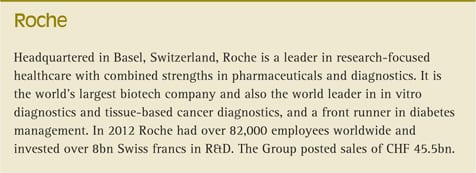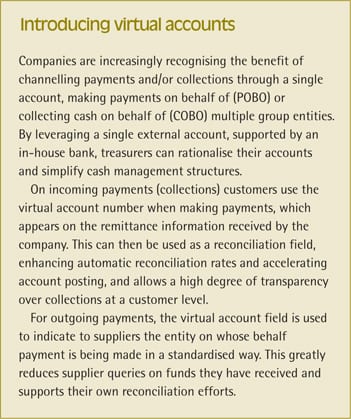Leading global pharmaceutical company Roche has had a relationship with Deutsche Bank’s Global Transaction Banking (GTB) division since 2005. One of the most recent innovations on which we have worked closely with Deutsche Bank is a ‘virtual account’ structure, enhancing our existing payments factory to enable greater efficiency and process harmonisation.

Business challenge
We faced a difficult challenge in that the banking partner with which we worked in Estonia made the decision to terminate its activities there at short notice. We therefore needed to find a solution rapidly to avoid interruption to our business. Rather than engaging another bank in Estonia, we opted to channel payments to Estonia through our payments factory, with payments made on behalf of our Estonian entity (POBO) through our Deutsche Bank euro account in Germany. This would be supported by our in-house bank. This included all outgoing payments, including salaries, tax payments and guarantees, but also incoming customer payments. While it is becoming more common to use POBO models to enhance the efficiency of payment factories, fewer companies are so far leveraging the advantages of centralised collections on a collections-on-behalf-of (COBO) model.

Solution and outcomes
Bearing in mind the business imperative, the solution had to be installed in a very timely fashion. We were impressed by Deutsche Bank’s responsiveness and commitment to deliver a robust, innovative solution within a short timescale. The immediate benefits have been significant. We have eliminated the need for local bank accounts, therefore simplifying our banking relationships and account structures. This in turn reduces our counterparty risk, external bank charges and the administrative effort required to manage accounts. There are other advantages too, however. By channelling payments and collections through a single account and business functon, our processes have been automated and formats standardised with a consistent view over payment and collection activities. At the same time, by leveraging virtual account numbers, we can automate processes such as reconciliation and account posting, enabling us to credit customer accounts promptly. This has a positive impact on customer satisfaction as collections that have been received but not posted are not chased inadvertently, and credit limits are released quickly to enable repeat business.
Although we have set up the solution in partnership with Deutsche Bank, it is bank agnostic, and by rationalising external accounts and standardising formats and remittance data, we have greater flexibility to add, remove or change our banking partners in the future at short notice, which is a valuable contribution to our risk management strategy.
Sign up for free to read the full article
Register Login with LinkedInAlready have an account?
Login
Download our Free Treasury App for mobile and tablet to read articles – no log in required.
Download Version Download Version






























